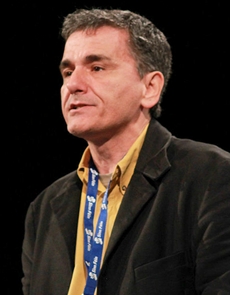Greece approves austere 2016 budget
07 Dec 2015
 Greek parliament has reluctantly passed an austerity budget for next year, amid pressure from the country's creditors who have sanctioned a third €86-billion ($93-billion) bailout in July to rescue the struggling nation from a financial collapse and a near-exit from the euro bloc.
Greek parliament has reluctantly passed an austerity budget for next year, amid pressure from the country's creditors who have sanctioned a third €86-billion ($93-billion) bailout in July to rescue the struggling nation from a financial collapse and a near-exit from the euro bloc.
The 'tough' budget was debated vigorously in a late-night parliament session on Saturday, before the ruling left-wing Syrisa party-led coalition government managed to clear it narrowly with 153 votes against 145.
''Nobody can cheer for this tough budget'', Euclid Tsakalotos, the country's finance minister said during the session.
Prime minister Alexis Tsipras said the budget was 'a difficult exercise' and behind its numbers 'anybody can see the agonising effort to support the working classes'.
The 2016 budget, the first one by Tsipras, forecasts near zero growth for the debt-laden euro zone nation in 2015 and a small 0.7-per cent contraction next year.
Despite the tax hikes and spending cuts, which include sensitive pension cuts, the country's debt is expected to grow to €328 billion or 188 per cent of gross domestic product (GDP).
The growth figures are better than the recent predictions by the International Monetary Fund (IMF), which envisaged a 2.3-per cent economic contraction in 2015 followed by a 1.4-per cent drop next year.
Tsipras expects growth momentum to pick up in the second half of 2016, and a strong tourist season could push the economy out of recession.
The IMF is hopeful of a real GDP growth of 2.7-per cent for Greece in 2017.
Tsipras, who in his election campaign vowed to unshackle the country from the harsh bailout conditions, later bowed to the troika of creditors comprising euro zone bloc, the IMF and the European Central Bank (ECB), to accept a stringent deal in July to save the country from a financial collapse.
Last month, the euro zone finance ministers demanded Greece to finalise the financial sector reforms as well as legislation to unlock €2 billion of bailout aid plus €10 billion for recapitalisation of its banks.
The euro zone as a whole, has registered a lackluster GDP growth of 0.3 per cent in the third quarter which was dragged down by weaker international trade in Germany, Italy and France but aided by improved consumer spending.
However, Greece beat expectations by shrinking only 0.5 per cent against an anticipated 1-per cent contraction in the third quarter.
The subdued growth figures prompted the ECB to step up its stimulus measures last week. The central bank cut interest rate by 0.1 percentage points to minus 0.3 per cent and extended its monthly bond purchase programme by six months to March 2017.
The actions failed to enthuse the markets, as they expected a higher rate cut and increase in monthly bond purchases.


















